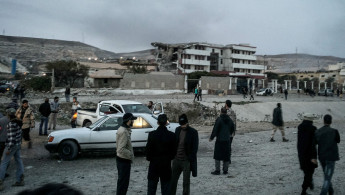Algeria refrains from open criticism of Egypt's Libya airstrikes
Algeria is, however, likely to be disappointed Egypt has breached existing understandings with Algeria to pursue a political solution to the crisis in Libya and limit foreign intervention.
Commentators in Algeria have described the Egyptian airstrike in Libya as an attempt by the government to improve its image domestically and win public support after the deaths of 40 Zamalek football fans a week ago.
Egypt bombs IS targets in Libya after mass killing. Read more |
"The airstrike in Libya is an attempt by the Egyptian army to prove its strength and readiness for action," said Bouhnia Goui, professor of political science at Kasdi Merbah Ouargla University in Algeria.
"[The army did this] because of talk it has been meddling in political life and because of the criticism of President Abdel Fatah el-Sisi, and the security apparatus' inaction, which led to the death of 40 Zamalek fans a week ago.
| The airstrike in Libya is an attempt by the Egyptian army to prove its strength and readiness for action. - Bouhnia Goui, Kasdi Ouargla University |
"The Egyptian army is trying to rectify and improve its image by appearing as if it is protecting Egyptians inside and outside the country."
Goui said Algeria was "disconcerted" by Egyptian military action in Libya because it cannot openly criticise it - despite calling for a negotiated political resolution to the country's crisis.
"Algeria has never had confidence in Egypt's position and has known about Egyptian military intervention in Libya in support of Haftar's forces for a long time.
"Algeria does not have the means to put pressure on the Egyptian government... [just] as it could not prevent France from intervening military in Mali."
Regional instability
Algeria's foreign ministry yesterday condemned the gruesome recent killings of Egyptian Copts in Libya by a group believed to be affiliated to the Islamic State group (IS, formerly known as Isis).
"Algeria strongly condemns the atrocious massacre committed by the wicked hands of the terrorist group called IS against innocent Egyptians in Libya," read the statement.
Algeria also reiterated its "firm stance against terrorism", calling on the international community for a coordinated response.
Ramtane Lamamra, Algiers' foreign minister, said that Libya must bear the weight of its own responsibilities, but needed support.
"Algeria is calling for Libyan sovereignty to be respected and for Libyan institutions to be strengthened through national reconciliation, it reiterates the calls for dialogue to solve the crisis in Libya and condemns all forms of terrorism," he said.
| Algeria has been cautious about openly declaring is position on Egyptian airstrikes in Libya. |
While the Algerian government has been cautious in its position towards Egyptian airstrikes in Libya, it declared its "commitment to continuing efforts" with neighbouring countries to reach a political resolution to the crisis.
But the mass murder of Egyptian Copts and the subsequent airstrike represents a major shift in the regional handling of Libya, said Goui.
It is possible, he said, that IS timed the massacre - formally announcing its presence in Libya - in order to disrupt the UN-brokered dialogue between rival Libyan groups.
The attack has also worried many Algerians now concerned about Boko Haram in Niger to the south and the IS group in Libya to the east.
"Algeria is threatened, and the army must coordinate with the Algerian diplomatic service - or an incident such as the killing of a French national will happen again, because of the increase in terrorist activity," said Goui.
"Militant Islamic groups - in particular the IS group - pose a threat to all governments, Algeria included."
This is an edited translation from our Arabic edition.



